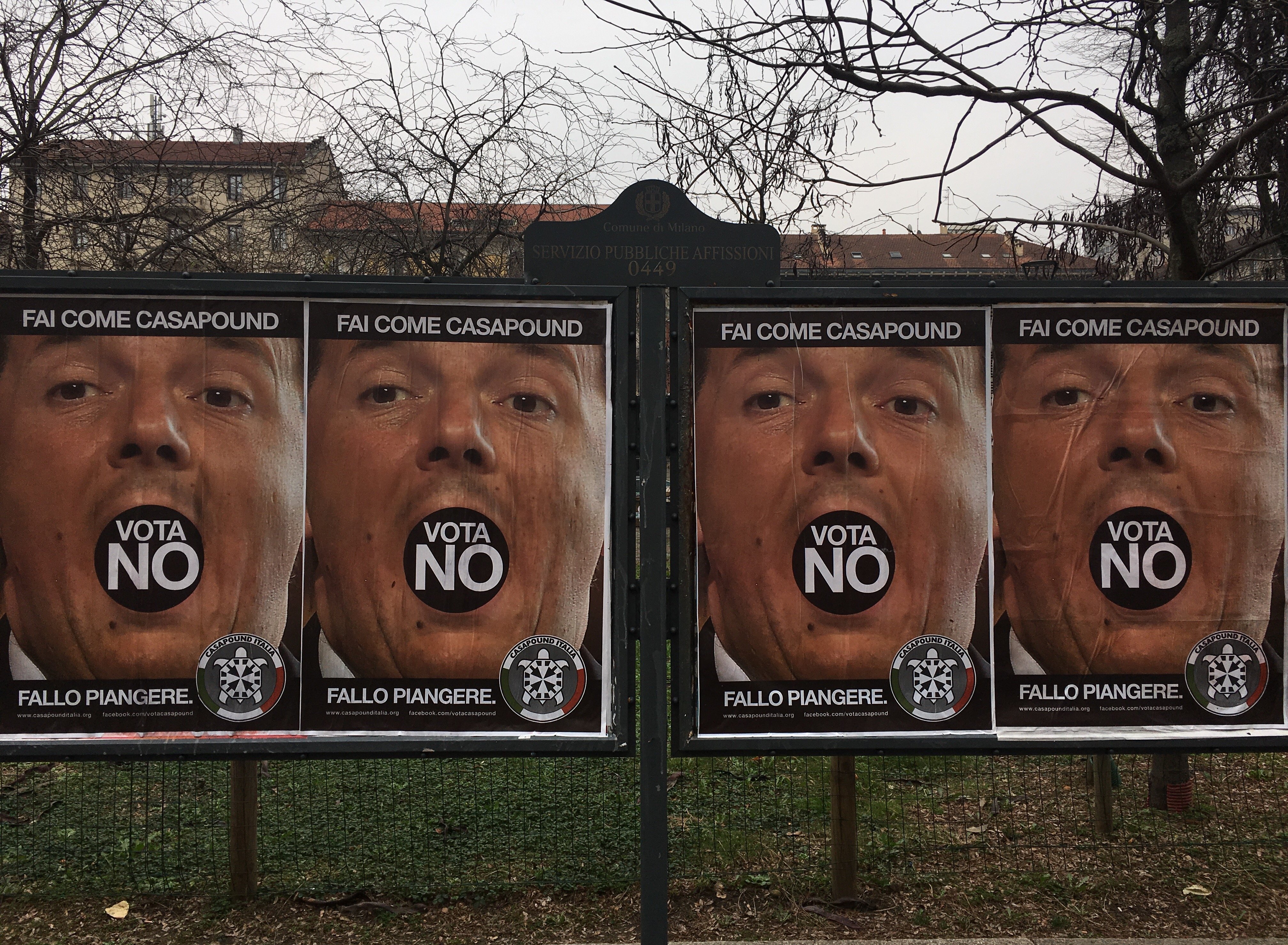
A Negroni, Per Favore, As the World Burns

A Negroni, Per Favore, As the World Burns

Sbagliatos in Milan
The atmosphere in Milan on Monday was eerie: a mix of fog and the looming political void.
When the results of Sunday’s constitutional referendum started pouring in late the night before, it was immediately clear that the country had answered with a roaring NO. It wasn’t a “no” to the proposed changes to the constitution, but to Prime Minister Matteo Renzi. Approaching a thousand days in office, Renzi arrogantly thought it would be a good idea to turn this referendum into a validation of his time in office. The result? Renzi lost what had effectively become a midterm election, and I needed a drink.
Despite asking all my sources at the prime minister’s residence, the Palazzo Chigi—who surely had nothing better to do the day after their boss declared his intention to step down—I wasn’t able to discover Renzi’s favorite cocktail. So I opted for a negroni sbagliato (commonly known simply as a sbagliato). The negroni was invented in Renzi’s hometown, Florence, where he was mayor for five years until becoming Prime Minister, and ‘sbagliato’ means wrong, as in this version of the drink, brut spumante replaces gin. I figured it’s a bit like him: solid, does the job, but not something you’re excited about.
The occasion deserved the best possible sbagliato, so I headed to the place where, legend has it, the wrong mix was first poured, by mistake, here in Milan: Bar Basso, an Italian drinks Mecca and a safe-haven for professionals and elites on all sides of the political spectrum; to each his aperitivo, after all.
“Italy is ungovernable: we’ve been stuck for ten years and we’ll continue being stuck for the next ten,” was the first thing I heard as I walked in.
A group of men in their sixties and seventies, wrapped in their coats and scarves, were talking politics while looking at YouTube videos on their phones. I later found out one of them had been the head of the city’s health department for ten years in the late nineties. He voted no. “But it doesn’t matter—whatever happens, Italians land on their feet.”

I would have never thought I’d vote for Renzi, and even the first sip of negroni sbagliato couldn’t soothe my guilt. He speaks like a know-it-all classmate who throws in a word or two of approximate English in every sentence, just because. But more importantly, Renzi is the man who ruined la sinistra, the Left, the people I remember marching in the streets chanting slogans from 1968 as I grew up.
Still, I somehow found reasons to stand with the ‘Scrapper,’ as Renzi famously called himself as he tried to reboot Italian politics. Maybe it’s because I’m part of the ‘elite’ that has become too disconnected from la cosa pubblica and the dire economic state of the homeland, but what scared me most was the thought of political paralysis. Our system is admittedly rusty, but it had just recently started working again, if not perfectly. And I feared—and still do—the international repercussions of a no vote, which will be twisted into the destructive narrative of a growing anti-establishment wave, destined to reshape Europe and the rest of the world.
The victory of the no vote in Italy is different from the Brexit and the Trump-astrophe: here, we’ve long been fans of the anti-establishment voto di pancia, literally ‘voting with the belly.’ We witnessed the rise of our own Trump, Silvio Berlusconi, as early as 1994, and with him we welcomed our homegrown UKIP, the Lega Nord, into the government for the first time.
Now, we’ve reached a new milestone in political thinking: reverse-reverse-psychology. If we wanted to vote against the usual political caste, we should have voted YES, since every familiar face in the country’s political landscape, from Berlusconi to the old roster of leftist leaders to the ‘anti-establishment’ Five Star Movement, supported NO. But we didn’t!
The antipathy for Renzi and the utter rage caused by high unemployment rates and poor economic growth overshadowed the fact that he was the closest we could get to change. Or maybe it’s the Italian habit of voting against the government, often oblivious of the repercussions abroad and at home. Not all Italians land on their feet, and the parties that backed NO have a pretty unsuccessful record of providing for those who don’t.
“I wanted to get rid of some seats,” said Renzi in his concession speech late Sunday night, “but eventually the one that blew up was mine.”
Back in the bar, the four men were cheering. “Viva Mattarella,” joked one, referring to the president, who must now form a provisional government before Christmas. The other three replied with Italy’s beloved all-purpose epithet: “Ma vaffanculo!”